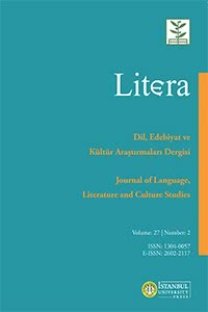Post-bellek Çağında Kuşaklararası Aktarım ve Rebecca Makkai’nin Music for Wartime Adlı Öykü Derlemesi
Öz Rebecca Makkai’s short story collection Music for Wartime (2015) features third-generation characters, like the author herself, who revisit the familial trauma narratives of the Second World War in Transylvania. The collection’s postmemorial dynamics therefore relies on the first generation’s lived experience mediated in transmission and the third generation’s new aesthetic concerns in reinterpreting them. However, the increasing generational distance in our postmemorial age has caused the traumatic narratives to reach the third generation by affiliative transmission at the same time as it has universalized and mystified the victim and the survivor. In Makkai’s collection, the fixed narratives mediated by the first generation and the past that is universalized by affiliative transmission demand a return to family narratives with a non-familial perspective. The collection’s unity is established by a form closer to a short story cycle. In accordance with the form, the stories sequentially reveal how the contemporary subject responds to familial and affiliative transmission. The collection’s intertwined dual structure encapsulates the strained connection between embracing and questioning the transmitted narratives. This article argues that, with its specific form, Rebecca Makkai’s Music for Wartime problematizes and symbolically resolves the question of intergenerational transmission within the dialectic of familial and affiliative memory.
Anahtar Kelimeler:
short story, trauma, memory, intergenerational transmission, Second World War
Intergenerational Transmission in the Age of Postmemory: Rebecca Makkai’s Music for Wartime
___
Adorno, T. (1983). Prisms. (Samuel and Shierry Weber, Tr.).Cambridge, MA: The MIT Press.Bender, T. (1982). Community and Social Change in America. Baltimore: The John Hopkins University Press.
Coontz, S. (2016). The Way We Never Were. New York: Basic Books.
Demos, J. (2000). A Little Commonwealth. New York: Oxford University Press.
Felman, S. (1992). The Return of the Voice: Claude Lanzmann’s Shoah. In Felman and Laub (Eds.), Testimony (pp. 204-83). New York: Routledge.
Hirsch, M. (1997). Family Frames: Photography, Narrative, and Postmemory. Cambridge, Mass.: Harvard University Press.
——-. (2012). The Generation of Postmemory. New York: Columbia University Press.
Hoffman, E. (2004). After Such Knowledge: A Meditation on the Aftermath of the Holocaust. London: Vintage.
Ingram, F. (1971). Representative Short Story Cycles of the Twentieth Century: Studies in a Literary Genre. The Hague: Mouton.
Márta, I. (1990). [Liner notes]. In Black Angels [CD). New York: Elektra/Nonesuch Records.
Laub, D. (1992). Bearing Witness, or the Vicissitudes of Listening. In Felman and Laub (Eds.), Testimony (pp. 57-74). New York: Routledge.
Levi, P. (2017). The Drowned and the Saved. (R. Rosenthal, Tr.). New York: Simon&Schuster. Lundén, R. (1999). The United Stories of America. Amsterdam: Rodopi.
Luscher, R. (1989). The Short Story Sequence: An Open Book. In S. Lohafer and J. E. Clarey (Eds.), Short Story Theory at a Crossroads (pp. 148-67). Baton Rouge and London: Louisiana State University Press.
Lynch, G. (2007). Mariposa Medicine: Thomas King’s Medicine River and the Canadian Short Story Cycle. In M. Dvorak and W. H. New (Eds.). Tropes and Territories: short fiction, postcolonial readings, Canadian writing in context (pp. 214-30). Montreal: McGill-Queen’s University Press.
Lyotard, J. F. (1988). The Differend. (D. van den Abbeele, Tr.). Minneapolis: University of Minnesota Press.
Makkai, R. (2015). Music for Wartime. New York: Viking.
March-Russell, P. (2009). The Short Story: An Introduction. Edinburgh: Edinburgh University Press.
Pacht, M. (2007). The Subversive Storyteller: The Short Story Cycle and the Politics of Identity in America. Newcastle upon Tyne: Cambridge Scholars Publishing.
Rice, C. (2016, April 20). Hypertext Interview with Rebecca Makkai [Web log post]. Retreived from https://www.hypertextmag.com/hypertext-interview-with-rebecca-makkai/
Rose, G. (1996). Mourning Becomes the Law. Cambridge: Cambridge University Press.
Smith, J. J. (2018). The American Short Story Cycle. Edinburgh: Edinburgh University Press.
Tatar, M. (1999). The Classic Fairy Tales. New York and London: Norton.
- Yayın Aralığı: Yılda 2 Sayı
- Yayıncı: İstanbul Üniversitesi
Sayıdaki Diğer Makaleler
Çeviri Odaklı Transdisipliner Pratikler: Organizmalardan Artırılmış Veri ve Çeviri Heykellerine*
Emine DEMİREL, Zeynep GÖRGÜLER
Fransızcadan Türkçeye Çeviride İlgi Eyleminin Dolaylı Yollarla Çevirisi
Polysemy and Dichotomy of the Bridge in Ödön von Horváth’s Hin und her
“The Greatest Empresse of the East”: Hurrem Sultan in English Restoration Drama
Aleks MATOSOĞLU, Arsun URAS YILMAZ
Haruki Murakami’nin Hipertextlerinde Performatif İşlevli Hikâye Anlatımı: Dün ve Şehrazad
